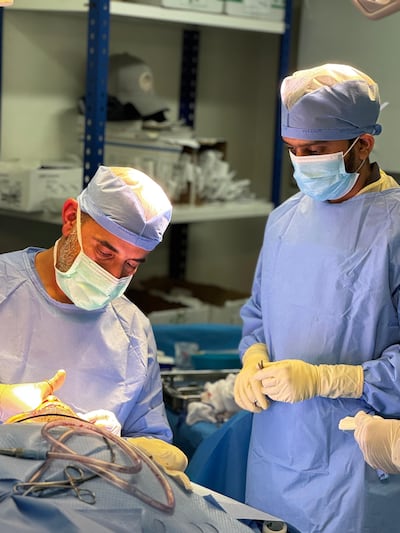Live updates: Follow the latest on Israel-Gaza
Emirati surgeon Dr Hamed Al Ahmad refused to let the constant threat of air strikes in Rafah deter him from doing his "national duty" in Gaza.
"I've treated many patients as bombs were being dropped in Rafah," Dr Hamed Al Ahmad said, recounting how Israeli attacks had intensified during the 103 days he worked at the UAE field hospital, which is located in the southern city of Rafah.
While working in a war zone, the challenge is to remain emotionally detached, the 46-year-old oral and maxillofacial surgeon told The National.
"You have to focus only on your patient's treatment and do the best you can in the dire situation," said Dr Al Ahmad.
"If you got emotional, then it would be very difficult to go on."
Despite the limitations of a field hospital in a war zone, Dr Al Ahmad has completed life-changing facial reconstruction for many Gazans.
"Usually, facial reconstruction cannot be done in the field hospital, but I did it," he said. None of his patients developed any subsequent infections, he added.
Most were treated for "broken bones, head and nerve injuries, and brain bleeding".
After his time at Rafah field hospital, set up as part of the UAE's Gallant Knight 3 operation to treat Palestinians injured in the conflict, Dr Al Ahmad has been stationed at the UAE’s floating hospital in the Egyptian city of Al Arish. He has been there since May 23.

Life in a war zone hospital
Apart from the heart-rending condition of his patients, the relentless bombing left Dr Al Ahmad sleep-deprived at nights.
"We used to sleep only for a few hours because of the loud explosions around us," he recalled. There were times he would stay up and watch the bombs going off in the distance as black smoke filled the sky, he added.
Every day he would wake up at 7am and attend a daily briefing at the hospital as they slotted the surgeries.
"After each strike, many patients, including children, would arrive and all three operation rooms would fill out," said Dr Al Ahmad.
The gratitude and resilience of his patients helped Dr Al Ahmad continue his work.
"The smile on their faces after treating them was the biggest motivation for me and my colleagues to carry on our duty," he said.
Dr Al Ahmad expressed immense pride at being able to "serve my brothers in such difficult situations".
"People were thanking the UAE for being on the ground to help them during their worst times," said Dr Al Ahmad.
Saving lives

Dr Al Ahmad, who arrived in Gaza in February, saved many lives but one particular case touched his heart.
A man had rushed his father into the emergency department after Israel bombarded their area with 16 air strikes.
"Half of Mohammed Al Jamal's face was crushed severely and his chance of survival was very low," said Dr Al Ahmad.
"When I broke the news to his son he just asked me to do what I could and said he had to go elsewhere.
"Upon more gentle questioning, the man eventually said he had to go "bury his sister"."
The news left Dr Al Ahmad shocked. "It was one of the toughest moments," he said.
Mr Al Jamal's condition stabilised and after three weeks in an intensive care unit, Dr Al Ahmad then carried out the four-hour facial reconstruction operation he needed.
"Mohammed is back to normal and can speak normally," he said.
A few days later, his son brought in his 10-year-old grandson, who had suffered a broken jaw.
"I operated on the little boy and the family couldn’t believe the results. Both survived," said Dr Al Ahmad.
The successful operations and well-stocked hospital were a result of the Emirati logistical teams in Al Arish, members of which ensured a steady supply of medicine and vital equipment.
Dr Al Ahmad is aware of the risks involved in working in a war zone, but believes it is his national duty to save lives.
"My family was scared when I told them I was going to Rafah but later they encouraged me to complete my humanitarian and national duty," he said.
He continues to treat injured Palestinians, about 50km from Rafah crossing border, at the UAE floating hospital in Al Arish.
"If they asked me to go [to Gaza] again, I would go without any hesitation," he said. "It is a humanitarian and national duty."


